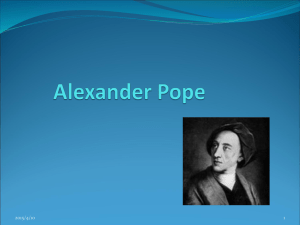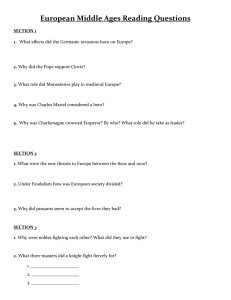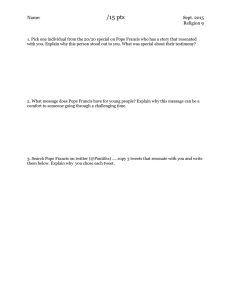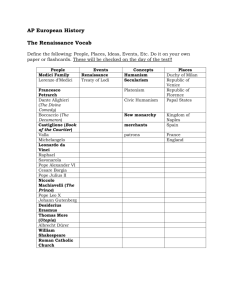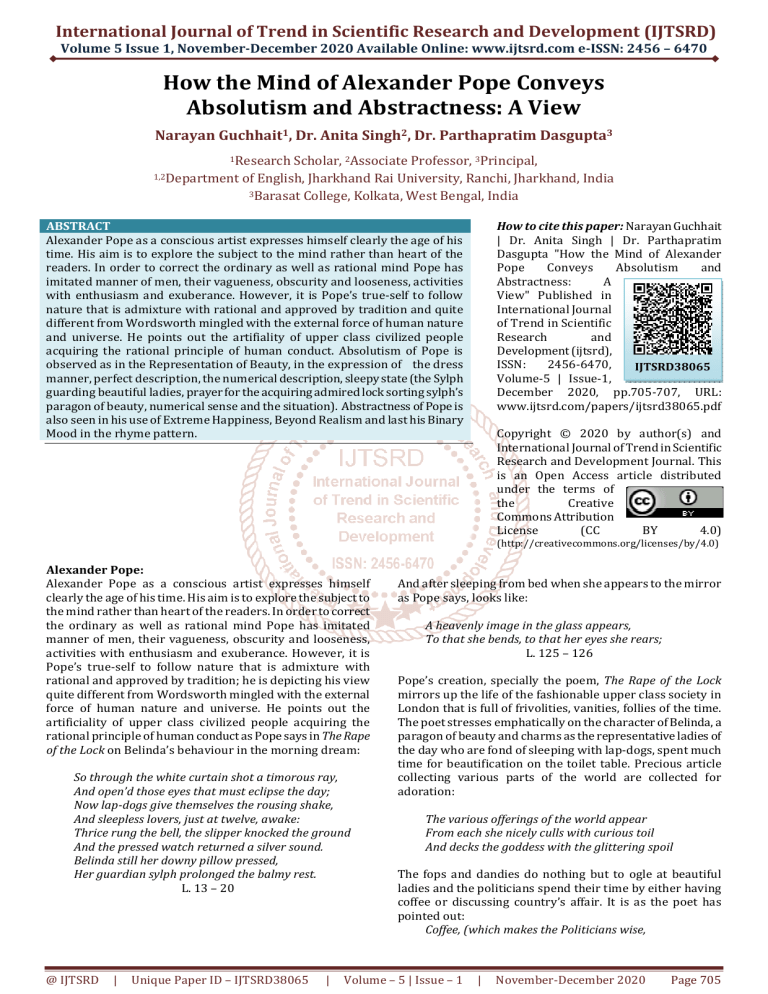
International Journal of Trend in Scientific Research and Development (IJTSRD) Volume 5 Issue 1, November-December 2020 Available Online: www.ijtsrd.com e-ISSN: 2456 – 6470 How the Mind of Alexander Pope Conveys Absolutism and Abstractness: A View Narayan Guchhait1, Dr. Anita Singh2, Dr. Parthapratim Dasgupta3 1Research Scholar, 2Associate Professor, 3Principal, 1,2Department of English, Jharkhand Rai University, Ranchi, Jharkhand, India 3Barasat College, Kolkata, West Bengal, India How to cite this paper: Narayan Guchhait | Dr. Anita Singh | Dr. Parthapratim Dasgupta "How the Mind of Alexander Pope Conveys Absolutism and Abstractness: A View" Published in International Journal of Trend in Scientific Research and Development (ijtsrd), ISSN: 2456-6470, IJTSRD38065 Volume-5 | Issue-1, December 2020, pp.705-707, URL: www.ijtsrd.com/papers/ijtsrd38065.pdf ABSTRACT Alexander Pope as a conscious artist expresses himself clearly the age of his time. His aim is to explore the subject to the mind rather than heart of the readers. In order to correct the ordinary as well as rational mind Pope has imitated manner of men, their vagueness, obscurity and looseness, activities with enthusiasm and exuberance. However, it is Pope’s true-self to follow nature that is admixture with rational and approved by tradition and quite different from Wordsworth mingled with the external force of human nature and universe. He points out the artifiality of upper class civilized people acquiring the rational principle of human conduct. Absolutism of Pope is observed as in the Representation of Beauty, in the expression of the dress manner, perfect description, the numerical description, sleepy state (the Sylph guarding beautiful ladies, prayer for the acquiring admired lock sorting sylph’s paragon of beauty, numerical sense and the situation). Abstractness of Pope is also seen in his use of Extreme Happiness, Beyond Realism and last his Binary Mood in the rhyme pattern. Copyright © 2020 by author(s) and International Journal of Trend in Scientific Research and Development Journal. This is an Open Access article distributed under the terms of the Creative Commons Attribution License (CC BY 4.0) (http://creativecommons.org/licenses/by/4.0) Alexander Pope: Alexander Pope as a conscious artist expresses himself clearly the age of his time. His aim is to explore the subject to the mind rather than heart of the readers. In order to correct the ordinary as well as rational mind Pope has imitated manner of men, their vagueness, obscurity and looseness, activities with enthusiasm and exuberance. However, it is Pope’s true-self to follow nature that is admixture with rational and approved by tradition; he is depicting his view quite different from Wordsworth mingled with the external force of human nature and universe. He points out the artificiality of upper class civilized people acquiring the rational principle of human conduct as Pope says in The Rape of the Lock on Belinda’s behaviour in the morning dream: So through the white curtain shot a timorous ray, And open’d those eyes that must eclipse the day; Now lap-dogs give themselves the rousing shake, And sleepless lovers, just at twelve, awake: Thrice rung the bell, the slipper knocked the ground And the pressed watch returned a silver sound. Belinda still her downy pillow pressed, Her guardian sylph prolonged the balmy rest. L. 13 – 20 @ IJTSRD | Unique Paper ID – IJTSRD38065 | And after sleeping from bed when she appears to the mirror as Pope says, looks like: A heavenly image in the glass appears, To that she bends, to that her eyes she rears; L. 125 – 126 Pope’s creation, specially the poem, The Rape of the Lock mirrors up the life of the fashionable upper class society in London that is full of frivolities, vanities, follies of the time. The poet stresses emphatically on the character of Belinda, a paragon of beauty and charms as the representative ladies of the day who are fond of sleeping with lap-dogs, spent much time for beautification on the toilet table. Precious article collecting various parts of the world are collected for adoration: The various offerings of the world appear From each she nicely culls with curious toil And decks the goddess with the glittering spoil The fops and dandies do nothing but to ogle at beautiful ladies and the politicians spend their time by either having coffee or discussing country’s affair. It is as the poet has pointed out: Coffee, (which makes the Politicians wise, Volume – 5 | Issue – 1 | November-December 2020 Page 705 International Journal of Trend in Scientific Research and Development (IJTSRD) @ www.ijtsrd.com eISSN: 2456-6470 Absolutism of Pope: Alexander Pope’s sense of absolutism is seen in the following manner in his writings. These are stated with references depicting how Pope’s mind is inclined to it. ------------The pow’rs gave Ear, and granted half his Prayer, The rest the Winds dispers’d in empty Air. L. -37 – 46 A. Representation of Beauty: Next the form of art and the artistic representation of beauty have been pointed out in Pope’s The Rape of the Lock92 where the poet describes Belinda, the heroine and the paragon of beauty to the theme of the poem falls in affairs of love to Lord Patre. An interesting image about the heroine has been presented when she enters into her toilet table on which the all treasures of the world were mysteriously arranged and used due to accelerate images to her own surroundings only. But the poet also presents the poem as a representative out look on his contemporary society especially on the manners of the aristocratic class or people. Doing this heroic tone and semi-epical convention were followed to shape the poem as the means of universal acceptance. Each line of the said poem consists with ten syllable of iambic variation mixed and at the end makes couplet with the use of punctuation marks. The form of the poem is specific as it is made of five Cantos in which Canto – I to V contains lines 147, 143, 178, 174, and 150 respectively. The numbers of full stop (.) used in the entire poem are 18, 46, and 49. 60 Presenting sorting sylphs for the assignment of guarding tusk to the paragon of beauty, Belinda in the Canto – II of the poem, The Rape of the Lock Pope says: To fifty chosen Sylphs, of special Note, We trust th’ important Charge, the Petticoat; Oft have we known that sev’n-fold fence to fail, ------------Form a strong Line about the Silver Bound, And guard the wide Circumference around. L. – 117 – 122 B. Dress and Manner: The dress and manner used by both Belinda and Petre and many others represented the aristocratic code manner bears strange motive; besides Belinda’s appearance after the attachment of toilet table is related to the enhancing image of beautification. The scenario of journey to boat, the description of different Sylphs and the resort place nearby Thames and particularly Queen Anne Palace and so on are the primary artistic presentation of the theme. C. Perfect Description: The poet’s achievement to the poem also suggests his perfect description about all that is cognate to the characterization, setting of supernatural atmosphere with Rosicrucinism, epical devices, use of satire as teaching morality, artificiality led by its dominated class, the form and diction produce not only distinctiveness but also a perfect presentation in literature. D. Number Description: Alexander Pope, of course, uses number description in his poem, The Rape of the Lock for various purposes like: 1. Presenting Belinda’s sleepy state as And sleepless lovers, just at twelve, awake: Thrice rung the bell, the slipper knocked the ground. 2. Narrating the Sylph guarding beautiful ladies like Belinda spoken by Ariel, the guardian of Sylph like priest or nurse in the dreamy state of the beauty queen: Fairest of mortals, thou distinguished care Of thousand bright inhabitants of air! E. Conveying Baron’s prayer for the acquiring admired lock of Belinda in Canto – II of The Rape of the Lock: But chiefly Love to Love an Altar built, Of twelve vast French Romances neatly gilt. There lay three Garters, half a pair of Gloves; @ IJTSRD | Unique Paper ID – IJTSRD38065 | F. G. Number of words suggesting numerical sense on the technique of playing cards are also presented in the following lines as Behold, four kings in Majesty rever’d, (L. – 37) And four fair Queen whose hands sustain a Flow’r, (L. – 39) Spadillo first, unconquerable Lord! Led off two captive Trumps, and swept the Board. (L. – 49 – 50) Put forth one manly Leg, to sight reveal’d, (L. – 57) To describe about the situation during the cutting of hair Alexander Pope applies number description like A two-edg’d Weapon from her shining Case; (L. – 129) Swift to the Lock a thousand Sprights repair, A thousand Wings, by turns, blow back the Hair, And thrice they twitch’d the Diamond in her Ear, Thrice she Look’d back, and thrice the Foe drew near. (L. – 135 – 138). Let Wreaths of Triumph now my Temples twine, (L. – 161) When numerous Wax-light in bright Order blaze, (L. – 168) H. To describe Belinda’s unhappy condition in Canto – V of The Rape of the Lock afterlosing her proud hair: Two Handmaids wait the Throne: Alike in Place. (L. – 25) Who rule the Sex to Fifty from Eifteen. (L. – 59) And thousands more in equal Mirth maintains. (L. – 66) Thrice from my trembling hand the Patch-box fell; (L. – 162) These, in two sable Ringlets taught to break. (L. – 169) Abstractness of Pope: Side by side another concept that is Abstractness of Pope is, of course, exhibited to present how the poet uses abstract sense describing the poetic matter through the following points. These points are discussed in the way mentioning below. A. Extreme Happiness: it is a feature of Abstractness found in the poem, The Rape of the Lock also when Belinda is in her drowsy dream prolonged by Ariel, the head of the sylphs and whispered stories about the loveliest lady among mortals and distinguished from all other mortal being by accompanied by enumerable bright warriors of air. After Belinda’s beautification appearance to her fellow follower compact with Lord Petre during the tour on the Thames make an impression how the lady feels happy. She takes her sit on the barge with the constellation of well-dressed youths wearing a sparkling cross on her white breast and making her nourishing two lock gracefully as well as equally hung behind her white neck, flushes her eyes equally to everyone who eagerly looks only at her. In the tea-table, after Ombre Volume – 5 | Issue – 1 | November-December 2020 Page 706 International Journal of Trend in Scientific Research and Development (IJTSRD) @ www.ijtsrd.com eISSN: 2456-6470 game was over, Belinda and his competitors were gathered there and Lord Patre, taking the cutting lock shows his extream joy as he shouted: Let Wreaths of Triumph now my Temples twine, (The victor cried) the glorious Prize is mine While Fish in Streams, or Birds delight in Air, Or in a Coach and Six the British Fair, As long as Atlantis shall be read, Or the small Pillow grace a Lady’s Bed, While Visits shall be paid on solemn Days, When num’rous Wax-lights on bright Order blaze, While Nymphs takes Treats or Assignations give, So long my Honour, Name, and Praise shall live! And see through all things with half-shut eyes) L. – 161 -170 B. Beyond Realism: It is other form of expressing absolute concept. In The Rape of the Lock poet has introduced supernatural machinery for the present the artificiality of nature imitated by the upperclass people in his time. The supernatural machineries are the token of sylphs and gnomes; they are being of small creature with power to change their shapes whatever they wish. They are large in number near-about fifty protecting dresses and beautiful ladies. The poet speaks about the supernatural beings as: For vSpirits, freed from mortal Laws, with ease. Assume what Sexes and what Shapes they please. (L. 69 – 70) Whatever Spirit, careless of his Charge, His Post neglects, or leaves the Fair at large, Shall feel sharp vengeance soon o’ertake his Sins Be stopt in Vials, or transfixt with Pins, Pope and Binary Mood: Binary Mood is actually an operation in Mathematics what has been discussed earlier in Milton. The Operation found in Milton’s is related to several forms as phrases, line and even stanza. But in Alexander Pope’s writings binary mood is observed in rhyme only. The rhyme scheme of Pope’s is basically heroic couplet following iambic pentameter that is aa bb cc - - - etc. The end of each line of his most prominent writings follow heroic couplet in binary mood because each line consists of ten syllables with two divisions in iambic form and ends with same sound. This is presented as example the very beginning line of The Rape of the Lock in the light of binary mood in the way like What di′re │Off-e′nce│ from a′m’│-rous Cau′s│-es spri′ng,- a What mi′ght│-y Co′n│-tests ri′se│ from trivi′│-al Thi′ngs, - a I si′ng│ – This Ve′rse │to Ca′r│-yll, Mu′se!│ Is due′; -b This, e′v’n│ Be-li′n│da ma′y│ vouch-sa′fe│ to vie′w: -b Slight i′s│ the Su′b│-ject, bu′t│ not so′│ the Prai′se, -c If She′│ ins-pi′re,│ and He′│ ap-pro′ve│ my Lay′s. -c @ IJTSRD | Unique Paper ID – IJTSRD38065 | It is remembered to say that how each disyllabic foot and couplet in the given example are cognate to binary mood. Conclusion: Pope, a renowned figure in the 18th century English Literature cherished ideas on absolutism and abstractness in his writings in the conventional as well realistic way. He has used the sense of absolutism that is seen the artistic representation of beauty, the dress-manner (that is the Code manner in aristocratic sense), setting of supernatural atmosphere, the numerical description, sorting of sylphs and situation etc. in his masterpiece, The Rape of the Lock in which the protagonist of the story are involved. Side by side his use of abstractness is observed in this poem also. His description of extreme happiness and true-self, realism and beyond realism and existence of God to the presentation of the story are related to his abstract sense. And his binary mood is also seen in his use of heroic couplet and iambic pentameter. Refinances: [1] Albert, Edward, History of English Literature, New Delhi: Oxford University Press, 1999. [2] Arthur Comptom-Rickett, A History of English Literature, New Delhi: UBS Publishers, 2000. [3] Cairncross, A. S. edited Poems Old and New (An Anthology) London: Macmillan, 1945. [4] Cunningham, J. S. ed. Alexander Pope – The Rape of the Lock, New Delhi: Khosla Publishing House, 2000. [5] Fifteen Poets, U.K.: Oxford University Press, 1999. [6] Jonson, Samuel, Lives of the English Poets, New Delhi: Universal Book Stall, 1999. [7] Kara Elizabeth Marken, “Between th’ extremes to move”: Antithesis in Alexander Pope’s Art, Thesis, Liberty University, 2011. [8] Kaul, R. K. Ed. Alexander Pope – The Rape of the Lock, New Delhi: Oxford University Press, 1993. [9] Sampson, George, The Concise Cambridge History of English Literature, London: Cambridge University Press, 1997. [10] Sanders, Andrew, The Short History of English Literature, U.K.: Oxford University Press, 2000. [11] Sir A. W. Ward and A. R. Waller ed. The Cabbridge History of English Literature (Vol. – IX), London: 1933. [12] Sir A. W. Ward and A. R. Waller ed. The Cabbridge History of English Literature (Vol. – IX), London: 1933. [13] Tilloson, Geoffrey. Edited The Rape of the Lock of Pope, New Delhi: A.I. T. B. S. Publishers & Distributors, 2003. [14] Turner Palgrave, Francis. Penguin Books, U. K., 1994. Volume – 5 | Issue – 1 | The Golden Treasury, November-December 2020 Page 707
